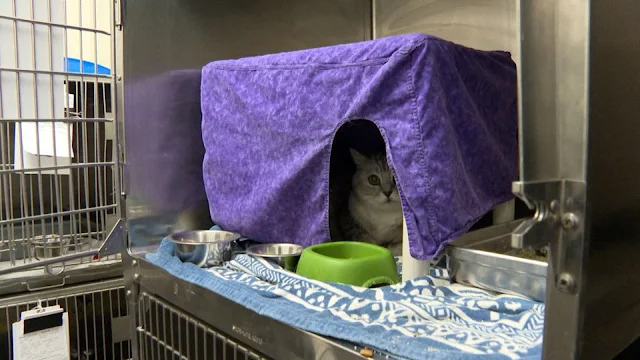NEWS AND OPINION: I'm on my high horse again but I think that this is a very relevant topic. But first things first. The Kingston Humane Society has a nice photograph of a cat in one of their cages and what I like about it is the customised tent in one corner of the cage where the cat can hide.
It's sad and nice at the same time. It's sad because cats in shelters need to hide because they are frightened but it is nice because the shelter has provided cats with a means to hide. A sort of home-from-home environment.
 |
| Kingston Humane Society cat in a cage with a tent to hide in. Image: the society. |
The fact that cats need to hide indicates that their true character is probably not going to be shown at a shelter because of anxiety induced by the shelter environment. This affects adoptions.
That's the first point out of the way. The second point is this: like other cat and animal shelters, this one has too many animals in their care. Their capacity is 144 and they currently care for 315 which is more than twice their capacity.
The director of the Kingston Humane Society, Gord Hunter, puts this down to the after-effects of the Covid pandemic and those long lockdowns during which some people impulsively adopted a companion animal.
And there is the problem: people adopted these abandoned companion animals on a known temporary basis. They must have known that the lockdowns were going to end within a defined time. They must've realised that at the end of those lockdowns they would have to go back to their normal work routine, and they should have asked themselves whether they would retain their cat or dog companion when that happened.
If they didn't do that and many didn't, they were not committed to being the caregiver of a companion animal for the life of the animal. And that is the only way to adopt a cat or dog. If a person can't make that commitment, they should not adopt.
There might be some culpability with animal shelters in this regard by adopting out cats and dogs to people during the pandemic perhaps realising that this was a temporary state of affairs.
For me, it's a question of raising standards of cat caregiving. I know it's boring to discuss this, but the flood of unwanted animals adopted inwards to shelters such as the one in Kingston indicates a less than optimal human-to-cat relationship and standard of care.
This state of affairs is one reason why there are feral cats which are a perceived problem to many people. There needs to be some way of raising standards in the interest of human society and animal welfare. Education is the best answer and regulations are a secondary solution.
Source: Global News.

No comments:
Post a Comment
Your comments are always welcome.
Note: only a member of this blog may post a comment.